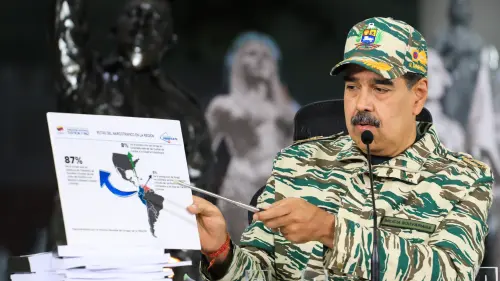# US-Venezuela Relations: Military Strike and Rising Tensions
The recent actions by the United States military against a suspected drug-trafficking vessel originating from Venezuela have dramatically escalated tensions between the two nations. This incident, marked by conflicting accounts and legal ambiguities, has ignited a fierce debate about international law, the use of military force, and the future trajectory of US-Venezuela relations. The situation demands a comprehensive examination.
## The Military Strike: Conflicting Narratives and Legal Justification
On September 4th, the US military destroyed a vessel allegedly involved in drug trafficking. The US administration, led by President Trump, claimed the vessel, originating from Venezuelan waters, was operated by the Tren de Aragua gang, designated a foreign terrorist organization. President Trump publicly stated that the strike resulted in 11 deaths. However, the circumstances surrounding the strike are highly contested.
Reports suggest that the vessel was attempting to turn away from the approaching US aircraft before being repeatedly struck. This information, obtained from sources familiar with the matter, casts doubt on the administration’s narrative of immediate threat. This raises serious questions: Was the use of lethal force truly necessary and proportionate to the perceived threat?
Venezuelan Interior Minister Diosdado Cabello vehemently denied the US account, asserting that none of the deceased were members of the Tren de Aragua gang. He stated that investigations conducted by the Venezuelan government revealed that the victims’ families confirmed their identities, and none were associated with the drug cartel. The stark contrast between the US and Venezuelan accounts underscores the urgent need for independent verification and investigation.
The Pentagon’s response to these accusations was firm and dismissive. Chief spokesperson Sean Parnell dismissed the Venezuelan government’s statements as the words of an “illegitimate narco-terrorist regime,” and reiterated the US military’s commitment to stopping drug trafficking in the region. This stance, however, further exacerbates the existing tensions and undermines efforts towards diplomatic resolution.
## International Law and the Use of Force: A Complex Legal Landscape

The legality of the US military action is a matter of intense scrutiny. While the US government maintains the strike was justified under international law and the president’s constitutional authority as commander-in-chief, legal experts have raised concerns. The use of lethal force in international waters, even against suspected drug traffickers, requires careful consideration of proportionality and the potential for civilian casualties. Did the US military adhere to these principles?
The lack of transparency surrounding the incident further complicates the legal analysis. The Pentagon’s refusal to comment on whether the boat was turning away before the strike raises further concerns about accountability. Transparency and a thorough investigation are crucial to determining whether the action was justified under international legal norms and whether due process was followed.
### Congressional Scrutiny and Accountability
The White House notified Congress of the strike, asserting that the president acted within his constitutional authority. However, this notification has not quelled concerns from lawmakers across the political spectrum. Members of Congress are demanding further information and a more detailed explanation of the legal justifications for the use of lethal force. This congressional scrutiny highlights the importance of accountability and the need for robust oversight of executive actions that have significant international implications.
The potential for further military action looms large. President Trump stated that the full scope and duration of necessary military operations are currently unknown, leaving open the possibility of future actions against suspected drug-trafficking vessels. This raises significant concerns about the potential for escalation and the long-term implications for regional stability.
The differing narratives surrounding the incident, the legal ambiguities, and the potential for further military actions have created a complex and volatile situation. The lack of independent verification and the absence of transparency from the US government have made it difficult to assess the legitimacy of the strike and understand its implications for US-Venezuela relations. What steps can be taken to de-escalate the situation and foster dialogue?
The future of US-Venezuela relations hinges on how both governments navigate this crisis. Open communication, transparency, and a commitment to international law are crucial for de-escalation and the pursuit of peaceful resolutions. Without these, the risk of further conflict and instability remains significantly high. The international community must play a role in advocating for a peaceful resolution and ensuring accountability for actions taken in international waters. Will dialogue prevail, or will this incident further deepen the chasm between the US and Venezuela?
The events surrounding the US military strike highlight the complex interplay between national security concerns, international law, and diplomatic relations. The situation demands a careful and considered response that prioritizes diplomacy, transparency, and a commitment to the rule of law. Failure to do so could have dire consequences for regional stability and international relations more broadly. What will the next steps be in this increasingly complex conflict?
